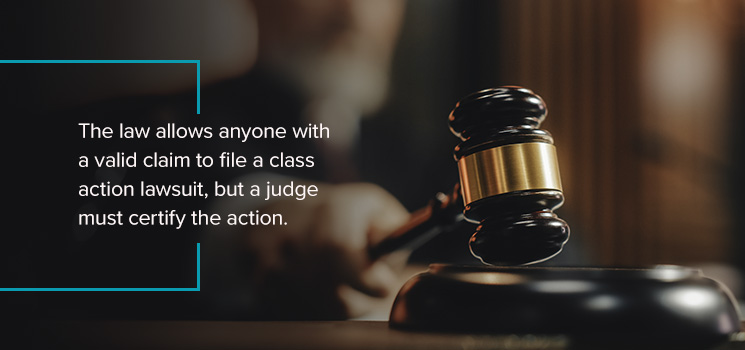Class action lawsuits offer a convenient, cost-effective and efficient route to resolve disputes involving multiple parties. However, the process can be complex. Before filing a class action suit in Pennsylvania, you should assess the facts of the case to know whether you have a valid claim and then determine if you qualify to conduct the case through a class action.
The judge will evaluate the facts of the case and deny or grant the order to proceed, so it helps to put your best foot forward by partnering with an experienced attorney.
What Is a Class Action?
Class action refers to a civil procedure allowing at least one person— natural or artificial— to bring an action on behalf of a group with a shared legal claim against a defendant or multiple defendants.
The person who initiates the legal action is called the “named plaintiff,” “lead plaintiff,” or “class representative,” whereas those persons on whose behalf the lead plaintiff sues are called the “class” or “class members.” This is a practical and convenient approach to enable each person affected by the defendants’ action to receive compensation rather than suing individually.
A typical example is when several persons patronize and consume products manufactured or sold by the defendants, which are defective and consequently result in some harm. The injured persons may sue the defendants through a class action lawsuit for legal remedies. Class actions are generally expeditious and cost-effective.
Class Action Laws in PA
You must consider several things to know if you have a class action case. We’ll address them by answering the following questions:
What Qualifies for a Class Action Lawsuit?
According to Rule 1702 of the Pennsylvania Rules of Civil Procedure, the following prerequisites are necessary when proving class action:
- The class is so large that it would be impractical to address the complaints individually.
- There are factual and legal questions that are common to the class members.
- The lead plaintiff’s claims or defenses are typical of the claims and defenses of the entire class.
- The lead plaintiff will fairly and adequately represent the interests of the entire class members.
- Class action offers a fair and efficient method for resolving disputes between the parties.
How Many People Are Required to Form a Class?
The numerosity requirement in PA does not provide an exact number of persons who can form a class to bring a class action. Typically, a class below 20 may need to be increased to pass the test, while classes of 40 or more would meet the requirements. Rather than relying on numbers, judges often consider the facts of each case before deciding whether a joinder is impracticable. In doing so, the following factors may guide the court:
- The ease of finding and identifying each class member
- The geographical separation of the members
- The size of the individual claims
- The class composition
- An individual’s motivation and ability to institute a separate action
- The nature of the claims
- The relief or remedies
Can Anyone File a Class Action Lawsuit?
The law allows anyone with a valid claim to file a class action lawsuit, but a judge must certify the action. Class certification is a procedure where the trial judge examines whether the plaintiffs qualify to initiate a class action lawsuit and gives an order allowing them to proceed.
What Kind of Wrongful Acts May Entitle You to Initiate a Class Action?
Generally, you can bring a class action in a civil case where the defendants’ conduct affects many people, but the typical examples in employment-related situations include the following:
- Employment discrimination: Where an employer discriminates against a large group of employees based on race, gender, age, religion or sexual orientation, those employees may bring a class action if they meet the legal requirements. Multiple federal and state laws prohibit all forms of discrimination, and a breach of those laws could trigger a cause of action.
- Employer retaliation: The law prohibits employers from retaliating against employees who exercise their legal rights or access privileges to which they are entitled. For example, employers should permit employees to participate in investigations of alleged discrimination or sexual harassment. Thus, if an employer punishes employees for partaking in such activities, the latter may institute a class action lawsuit to address their concerns.
- Contract disputes: Contract disputes are a primary catalyst of class action lawsuits. The reason is that most employers use standard-form contracts to govern their relationships with employees. Therefore, several employees will likely be affected when the employer breaches that contract.
- Wage and hour claims: The law mandates employers to comply with the wage and hour laws in PA, including the Fair Labor Standards Act (FSLA) and the Wage Payment and Collection Law (WPCL). Where a breach of such laws affects multiple employees, they may institute a class action. A classic example is when the employer refuses to pay employees.
Other wrongful acts that may trigger class action lawsuits are:
- Consumers suffering from defective products
- Defrauding consumers
- Workplace safety violations
- Background check errors
- Improper classification of as independent contractors
How Do You File Class Action?
Here are six steps to help you file a class action lawsuit:
- Evaluate the case to know whether you have a legal claim and if a class action is an appropriate approach to seek relief in court. Since this requires a good understanding of the law and could be technical, engaging the services of a highly skilled attorney is recommended.
- An attorney will draft a complaint that describes the facts leading to the injury, the persons affected by the misconduct and the reliefs you’re seeking.
- File the motion for certification of class action and prove to the judge that you are qualified to proceed under a class action. The judge will either grant or deny the motion.
- In the discovery phase, you may request documents to help you proceed with your case from the defendants and conduct dispositions of individuals who know something about the facts leading up to the suit.
- Negotiate settlement if the defendants agree to resolve the dispute out of court. Otherwise, you may have to proceed to trial to prove your case.
- Notify the class members about the outcome of the suit.
Can You Join a Class Action Case?
Yes, you may join a class action lawsuit if you believe you suffer an injury common with the other class members. The damage may be physical or financial, whether it relates to your person or assets. Additionally, the defendant must be responsible for causing such incidents.
Does the Lead Plaintiff Receive Extra Compensation?
The court may award the lead plaintiff added financial incentives for a well-done job. This is especially the case when they attend all court proceedings and satisfactorily represent the interest of the class members.
Get a Free Consultation From Weisberg Cummings
Weisberg Cummings dedicates its resources to helping persons with legal challenges solve their problems in an efficient yet friendly manner. Our attorneys have over 40 years of combined experience conducting class action lawsuits in PA. Whether the case goes to trial or is settled out of court, we ensure you get what you deserve. Contact us now for a free consultation!



